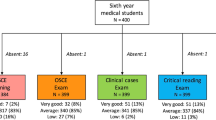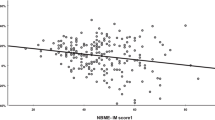Abstract
Evidence shows that medical students from Minority Ethnic (ME) backgrounds and male medical students underperform in undergraduate examinations. Our study confirmed these findings in first year clinical (year 3) medical students, and further explored this disparity in performance. We conducted a series of meta-analyses to measure the effects of sex and ethnic group on the written examination and Objective Structured Clinical Examination (OSCE) scores of three groups of year 3 medical students at two London UK medical schools (n = 1,051; 46.0% male; 48.7% White). Male and ME students scored lower on written and OSCE assessments. Both assessments were statistically significantly correlated (mean r = 0.45) and therefore the effects of sex and ethnic group were measured on each exam after being adjusted for the effect of the other. Although sex and ethnic differences remained on the OSCE when adjusted for written performance, these differences disappeared on the written when it was adjusted for OSCE performance. These findings may reflect a relative deficit in practical clinical knowledge in male and ME year 3 students. Results were unlikely to be due to examiner bias, as the machine-marked unadjusted written exam results showed significant sex and ethnic differences.


Similar content being viewed by others
References
Bienstock, J. L., Martin, S., Tzou, W., & Fox, H. E. (2002). Medical students’ gender is a predictor of success in the obstetrics and gynecology basic clerkship. Teaching and Learning in Medicine, 14(4), 240–243.
Coles, C. (1998). How students learn: The process of learning. In B. Jolly & L. Rees (Eds.), Medical education in the millennium (pp. 63–82). Oxford: Oxford University Press.
Dillner, L. (1995). Manchester tackles failure rate of Asian students. British Medical Journal, 310, 209.
Haq, I., Higham, J., Morris, R., & Dacre, J. (2005). Effect of ethnicity and gender on performance in undergraduate medical examinations. Medical Education, 39, 1126–1128.
Higham, J., & Steer, P. J. (2004). Gender gap in undergraduate experience and performance in obstetrics and gynaecology: Analysis of clinical experience logs. British Medical Journal, 328, 142–143.
Howell, D. C. (2002). Statistical methods for psychology (5th ed.). Belmont, CA: Thomson Wadsworth.
James, D., & Chilvers, C. (2001). Academic and non-academic predictors of success on the Nottingham undergraduate medical course 1970–1995. Medical Education, 35, 1056–1064.
Kay-Lambkin, F., Pearson, S. A., & Rolfe, I. (2002). The influence of admissions variables on first year medical school performance: A study from Newcastle University, Australia. Medical Education, 36(2), 154–159.
Koenig, J. A., Sireci, S. G., & Wiley, A. (1998). Evaluating the predictive validity of MCAT scores across diverse applicant groups. Academic Medicine, 73(10), 1095–1106.
Liddell, M. J., & Koritas, S. (2004). Effect of medical students’ ethnicity on their attitudes towards consultation skills and final year examination performance. Medical Education, 38, 187–198.
Lumb, A., & Vail, A. (2004). Comparison of academic, application form and social factors in predicting early performance on the medical course. Medical Education, 38, 1002–1005.
Martin, I. G., Stark, P., & Jolly, B. (2000). Benefiting from clinical experience: The influence of learning style and clinical experience on performance in an undergraduate objective structured clinical examination. Medical Education, 34, 530–534.
McDonough, C. M., Horgan, A., Codd, M. B., & Casey, P. R. (2000). Gender differences in the results of the final medical examination at University College Dublin. Medical Education, 34, 30–34.
McManus, I. C., Richards, P., Winder, B., & Sprotson, K. (1996). Final examination performance of medical students from ethnic minorities. Medical Education, 30(3), 195–200.
McManus, I. C., Richards, P., Winder, B., & Sprotson, K. (1998). Clinical experience, performance in final examinations, and learning style in medical students: prospective study. British Medical Journal, 316, 345–350.
Thalheimer, W., & Cook, S. (2002). How to calculate effect sizes from published research articles: A simplified methodology. Retrieved from http://work-learning.com/effect_sizes.htm. Accessed 12 March 2007.
Wass, V., Roberts, C., & Hoogenboom, R. (2003). Effect of ethnicity on performance in a final OSCE: Qualitative and quantitative study. British Medical Journal, 326, 800–803.
Wilkinson, T. J., & Frampton, C. M. (2004). Comprehensive undergraduate medical assessments improve prediction of clinical performance. Medical Education, 38, 1111–1116.
World Federation for Medical Education. (2003). Basic medical education. WFME global standards for quality improvement. Copenhagen: WFME.
Xu, G., Veloski, J. J., Hojat, M., Gonnella, J. S., & Bacharach, B. (1993). Longitudinal comparison of the academic performances of Asian–American and White medical students. Academic Medicine, 68(1), 82.
Acknowledgements
Thank you to Henry W.W. Potts and to anonymous reviewers for their helpful comments.
Author information
Authors and Affiliations
Corresponding author
Rights and permissions
About this article
Cite this article
Woolf, K., Haq, I., McManus, I.C. et al. Exploring the underperformance of male and minority ethnic medical students in first year clinical examinations. Adv in Health Sci Educ 13, 607–616 (2008). https://doi.org/10.1007/s10459-007-9067-1
Received:
Accepted:
Published:
Issue Date:
DOI: https://doi.org/10.1007/s10459-007-9067-1




